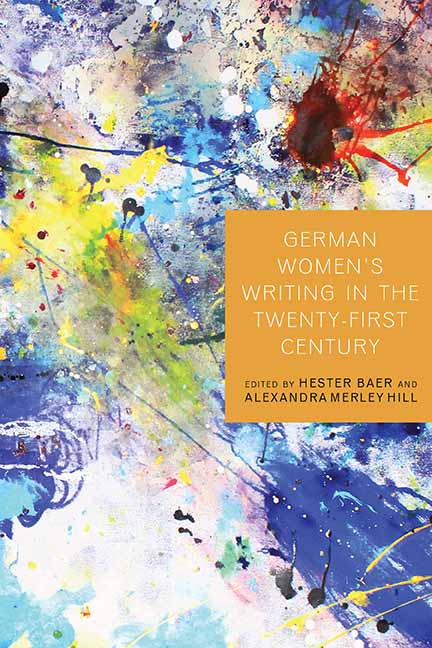Book contents
- Frontmatter
- Dedication
- Contents
- Acknowledgments
- Introduction: German Women’s Writing Beyond the Gender Binary
- 1 Language-Bodies: Interpellation and Gender Transition in Antje Rávic Strubel’s Kältere Schichten der Luft and Judith Hermann’s “Sonja”
- 2 Matrilineal Narrative and the Feminist Family Romance
- 3 The Pitfalls of Constructing a Female Genealogy: Cultural Memory of National Socialism in Recent Family Narratives
- 4 Reckoning with God: Attitudes toward Religion in German-Language Women’s Writing in the Twenty-First Century
- 5 Muslim Writing, Women’s Writing
- 6 Popfeminism, Ethnicity, and Race in Contemporary Germany: Hatice Akyün’s Popfeminist Autobiographic Works Einmal Hans mit scharfer Soße (2005) and Ali zum Dessert (2008)
- 7 The Awkward Politics of Popfeminist Literary Events: Helene Hegemann, Charlotte Roche, and Lady Bitch Ray
- 8 The Indictment of Neoliberalism and Communism in the Novels of Katharina Hacker, Nikola Richter, Judith Schalansky, and Julia Schoch
- 9 Sounds of Silence: Rape and Representation in Juli Zeh’s Bosnian Travelogue
- Bibliography
- Notes on the Contributors
- Index
4 - Reckoning with God: Attitudes toward Religion in German-Language Women’s Writing in the Twenty-First Century
Published online by Cambridge University Press: 25 May 2021
- Frontmatter
- Dedication
- Contents
- Acknowledgments
- Introduction: German Women’s Writing Beyond the Gender Binary
- 1 Language-Bodies: Interpellation and Gender Transition in Antje Rávic Strubel’s Kältere Schichten der Luft and Judith Hermann’s “Sonja”
- 2 Matrilineal Narrative and the Feminist Family Romance
- 3 The Pitfalls of Constructing a Female Genealogy: Cultural Memory of National Socialism in Recent Family Narratives
- 4 Reckoning with God: Attitudes toward Religion in German-Language Women’s Writing in the Twenty-First Century
- 5 Muslim Writing, Women’s Writing
- 6 Popfeminism, Ethnicity, and Race in Contemporary Germany: Hatice Akyün’s Popfeminist Autobiographic Works Einmal Hans mit scharfer Soße (2005) and Ali zum Dessert (2008)
- 7 The Awkward Politics of Popfeminist Literary Events: Helene Hegemann, Charlotte Roche, and Lady Bitch Ray
- 8 The Indictment of Neoliberalism and Communism in the Novels of Katharina Hacker, Nikola Richter, Judith Schalansky, and Julia Schoch
- 9 Sounds of Silence: Rape and Representation in Juli Zeh’s Bosnian Travelogue
- Bibliography
- Notes on the Contributors
- Index
Summary
IN THIS ARTICLE I EXAMINE the place of religious beliefs, and the interrelation between religion and gender, in a selection of twenty-first-century German-language prose fiction written by women. In line with the widespread recognition of a “religious turn” or “(re)sacralization” that is transforming political and cultural discourse in the “post-secular society” in which we live, the role of religion in contemporary German-language literature is subject to increasing scrutiny. In German literary studies the depiction of Islam in Germanic culture and the history of German-Jewish identity currently receive much more explicit attention than the place of Christian faith. Julian Preece and Frank Finlay discuss this bias in their edited volume Religion and Identity in Germany Today. They speculate that the non-religious backgrounds of most “white” Germanlanguage authors and the academics who analyze their texts—who nonetheless belong to national traditions that have been strongly influenced by Christianity—mean that they have to rediscover a conceptual apparatus in order to address the Christian God. The same critics are more at ease when discussing Muslim and Jewish religious beliefs, which, arguably, do not have the same disconcerting relation to their own intellectual heritage. It is precisely this capacity of religious beliefs to unsettle and disconcert—their demand for a reckoning with or without God—that interests me in the literary texts here, and I follow this process of reckoning in relation to Jewish and Christian conceptions of God.
Nicolas Boyle has described how twentieth-century writers’ recurring engagement with the confrontation between religion and secularity is one of the means by which they are able to conceptualize some of the most profound changes in notions of personal and collective identity entailed by modern life. Boyle's assessment remains true for writers in the twenty-first century, and for the female novelists whose work I consider here, religious identity is a key aspect of characterization and frequently serves as a means of exploring other aspects of identity, including their gender, because of the ways in which experiences of religion intersect with and impinge upon other means of self-understanding.
- Type
- Chapter
- Information
- German Women's Writing in the Twenty-First Century , pp. 74 - 94Publisher: Boydell & BrewerPrint publication year: 2015

